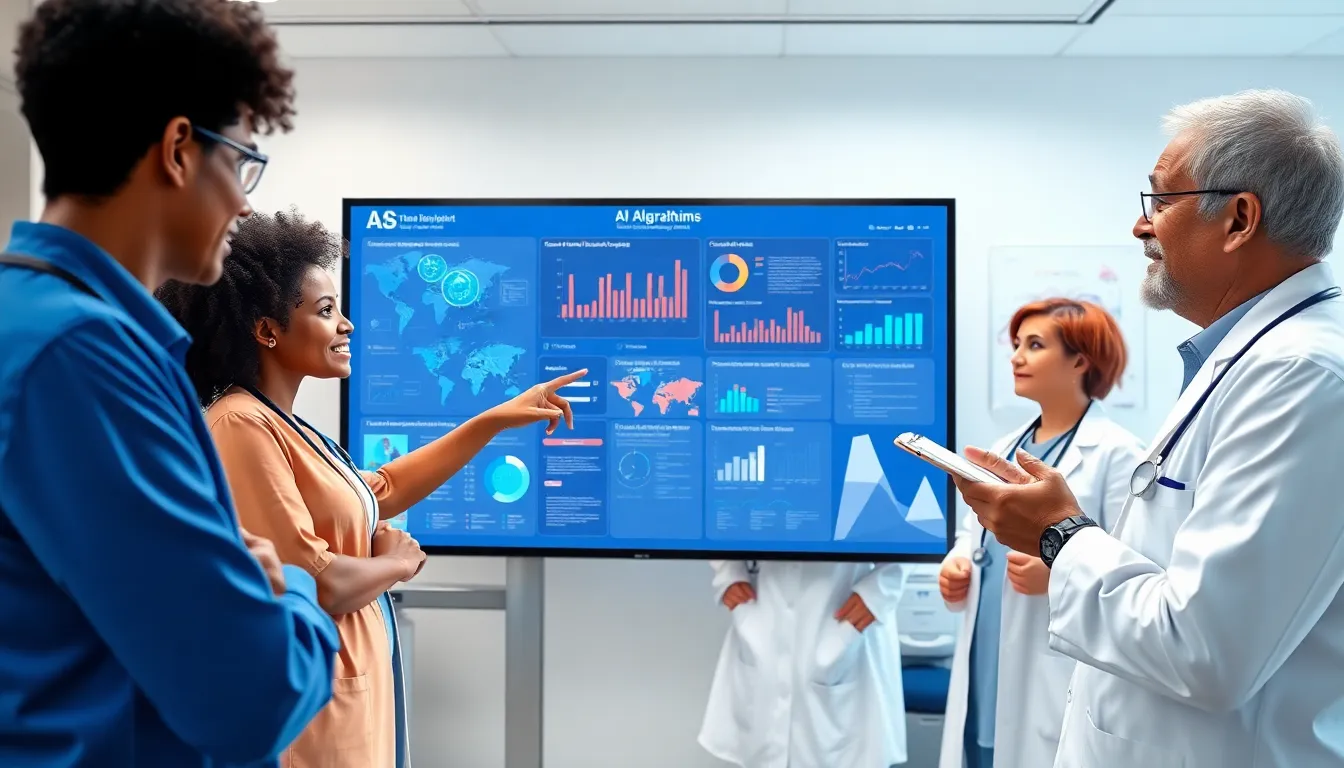In a world where your coffee maker might just be smarter than your last employee, the Internet of Things (IoT) is transforming the business landscape. Imagine a workplace where your devices communicate seamlessly, boosting efficiency and productivity while you sip your perfectly brewed latte. It’s not just sci-fi anymore; it’s the reality businesses are embracing today.
From smart sensors that track inventory to connected devices that streamline operations, IoT offers a treasure trove of opportunities. Companies that harness this technology are not just keeping up; they’re sprinting ahead of the competition. So, if you’re ready to turn your business into a tech-savvy powerhouse, buckle up! The IoT revolution is here, and it’s time to get on board before your toaster starts giving you business advice.
Table of Contents
ToggleOverview of IoT for Businesses
The Internet of Things (IoT) transforms how businesses operate. Smart devices connect businesses to real-time data, enabling informed decision-making. Companies utilize smart sensors to monitor inventory levels, resulting in streamlined supply chains.
Integration of connected devices improves operational efficiency. For example, manufacturing plants can employ IoT technology to track machine performance, enhancing productivity. Logistics providers optimize routes with IoT, minimizing delivery times and costs.
Data generated by IoT devices offers valuable insights. Analytics derived from this data helps identify trends and improve customer experiences. Businesses leverage these insights to tailor their services and products to meet specific needs.
Security remains a crucial concern with IoT implementation. Companies must prioritize robust cybersecurity measures to protect sensitive data. Adopting encryption and advanced authentication techniques reduces risks associated with connected devices.
Investment in IoT infrastructure often yields significant returns. Research indicates businesses adopting IoT solutions experience an increase in operational efficiency by up to 30%. Furthermore, cost reductions and improved customer satisfaction further establish its value.
Collaboration with IoT solution providers enhances implementation success. Partnerships allow businesses to access expertise and resources critical for effective IoT integration. A well-executed strategy fosters innovation and maintains competitiveness in an evolving market.
Emphasizing continuous improvement allows organizations to adapt to IoT advancements. Rapid technological changes encourage a proactive approach to embracing new tools and solutions. This mindset will ensure businesses harness the full potential of IoT to drive growth.
Key Benefits of IoT for Businesses

IoT technology provides several key benefits for businesses that seek to improve their operations and customer engagement. These advantages significantly impact efficiency, data collection, and customer insights.
Improved Efficiency
Increased efficiency is one of the primary benefits of IoT. Smart devices streamline processes, reducing manual labor and human errors. Companies can monitor equipment in real-time, allowing for timely maintenance and preventing costly downtimes. Automation of routine tasks enables employees to focus on higher-value activities, boosting overall productivity. Statistics show businesses adopting IoT can see up to a 30% increase in operational efficiency, underscoring the motivating advantages of this technology.
Enhanced Data Collection
IoT enhances data collection capabilities, facilitating better-informed decision-making. Connected devices continuously collect and transmit data, providing insights into various operational aspects, such as inventory levels and production metrics. This real-time information enables leaders to identify trends and make proactive adjustments. By analyzing this data, businesses can refine their processes, optimize resource allocation, and minimize waste, ultimately driving better outcomes.
Better Customer Insights
Improving customer insights stands out as another significant benefit of IoT. Through monitoring customer interactions and behaviors, companies gain a deeper understanding of consumer preferences. This information allows businesses to tailor their offerings to meet demand more effectively. Implementation of IoT solutions enables personalized experiences, helping companies foster customer loyalty. Enhanced insights ultimately increase sales and improve brand reputation.
Challenges in Implementing IoT for Businesses
Implementing IoT technology presents several challenges that businesses must navigate. These include security concerns and integration complexities with existing systems.
Security Concerns
Security remains a top issue for organizations adopting IoT. Attackers often target connected devices, which can expose sensitive data. Device vulnerabilities arise when manufacturers neglect robust security features, leaving networks susceptible. Regularly updating software and implementing strong encryption measures provides a defense against breaches. Investing in cybersecurity training for employees also enhances awareness and vigilance against potential threats.
Integration with Existing Systems
Integrating IoT solutions into current systems poses significant challenges. Compatibility issues often arise due to varying technologies and protocols. Businesses face hurdles when legacy systems lack the capacity to interact with new IoT devices. Developing a cohesive strategy for integration simplifies this process. Partnering with technology providers who specialize in IoT can facilitate smoother transitions and minimize disruptions in daily operations. Engaging in thorough testing ensures that all systems function harmoniously, ultimately leading to a successful implementation.
Success Stories of IoT in Various Industries
Retailers increasingly use IoT for enhancing customer experiences. Smart shelves equipped with weight sensors help track inventory in real time, ensuring stock availability. Companies like Walmart have implemented such technologies, leading to a reported 30% reduction in stockouts.
Manufacturing benefits greatly from IoT as well. Siemens integrates IoT sensors into production lines, enabling predictive maintenance that reduces downtime by 15%. Data collected from these devices allows managers to quickly identify inefficiencies and address them proactively.
Healthcare organizations are adopting IoT to monitor patient health remotely. For instance, Philips’ connected health devices empower patients to share vital signs with healthcare providers instantly. This innovation leads to more timely interventions, improving patient care outcomes significantly.
Transportation demonstrates remarkable improvements with IoT technologies. Fleet management systems, such as those used by FedEx, rely on GPS and IoT data to optimize routing. Consequently, these enhancements lead to cost savings of around 10% and reduce delivery times.
Energy companies utilize IoT to monitor usage and efficiently manage resources. Smart meters allow households to track energy consumption in real time, enabling better energy management. For instance, Pacific Gas and Electric reported a 20% increase in energy efficiency following the deployment of smart meters.
Agriculture also sees transformative effects from IoT applications. Farmers employ connected sensors to monitor soil moisture and weather conditions, improving crop yield. By utilizing these tools, organizations like John Deere have increased productivity, resulting in higher revenue.
Sectors across the board recognize the advantages of embracing IoT solutions. Companies leveraging IoT across these varied applications see not only improved efficiency but also a stronger competitive footing in their respective markets.
Future Trends in IoT for Businesses
Emerging trends in the Internet of Things (IoT) significantly influence business strategies. Adoption of edge computing enhances real-time data processing, allowing quicker decision-making at the source. Organizations increasingly rely on artificial intelligence and machine learning to derive deeper insights from the data generated by connected devices.
Another notable direction focuses on enhanced connectivity through 5G networks. These networks promise faster speeds and reduced latency, enabling seamless communication between devices. Companies leverage this to improve operational efficiency and enhance customer experiences.
Sustainability drives IoT implementations toward energy-efficient solutions. Businesses utilize IoT for monitoring energy consumption, thus reducing waste and environmental impact. The integration of smart energy management systems, for instance, aids firms in meeting regulatory requirements and corporate sustainability goals.
Security solutions evolve alongside IoT advancements. With increasing cyber threats, businesses recognize the necessity for robust cybersecurity frameworks. Continuous monitoring and advanced encryption techniques mitigate risks and protect sensitive information.
Moreover, predictive analytics gain traction as a tool for performance optimization. By analyzing historical data, companies anticipate equipment failures and schedule maintenance proactively. This approach minimizes downtime and reduces operational costs significantly.
Remote work environments also influence IoT trends. As organizations adapt to hybrid models, connected devices help facilitate collaboration and maintain productivity. IoT applications streamline workflows and support effective communication across dispersed teams.
Investment in IoT technologies continues to rise, reflecting growing confidence in its potential. Data indicates a possible 30% increase in operational efficiency due to strategic IoT implementations. Companies prioritizing these technologies position themselves favorably in a competitive marketplace, reaping the long-term benefits of IoT adoption.
Embracing IoT technology is no longer optional for businesses aiming to thrive in today’s competitive landscape. The ability to harness real-time data and optimize operations enables companies to stay agile and responsive to market demands.
With the right strategies in place businesses can significantly enhance efficiency and customer satisfaction. As they navigate the challenges of implementation and security concerns investing in IoT solutions will yield substantial long-term benefits.
The future of business is interconnected and those who adapt to these advancements will undoubtedly lead the way in innovation and growth.





